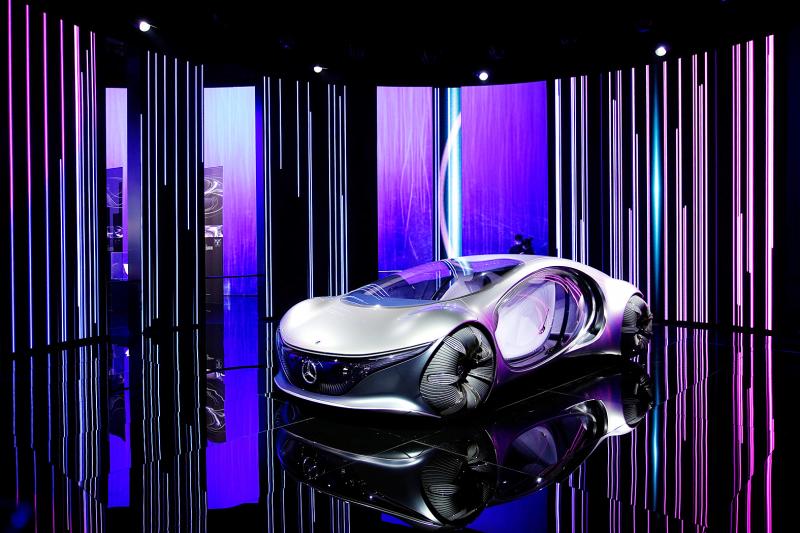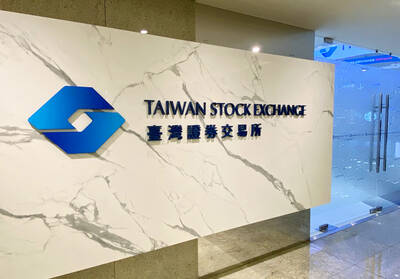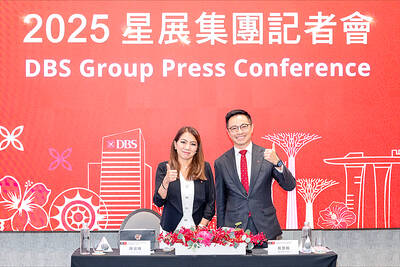Volkswagen AG, Ford Motor Co and Chinese brands yesterday unveiled new sports utility vehicles (SUVs) for China’s growing market at the Shanghai Auto Show, the industry’s biggest marketing event in a year overshadowed by the COVID-19 pandemic.
Automakers are looking to China, the biggest auto market by sales volume and the first major economy to rebound from the pandemic, to propel a sales revival and reverse multibillion-dollar losses.
Auto Shanghai takes place under anti-virus controls that included holding some news conferences by video link. Few executives from abroad are attending. Reporters were required to undergo virus tests.

Photo: Reuters
The latest models reflect accelerating momentum toward electrification and designing models for Chinese tastes. Automakers rely increasingly on research and design centers in China to create models for global sale.
Volkswagen said its all-electric ID.6, available in six and seven-seat models, aims to create a “lounge on wheels” with semi-automated driving and other technology.
The show also highlights the fast-growing technology and design skills of China’s young, but ambitious domestic brands.
Geely Automobile Holdings Ltd (吉利汽車), part of the Geely Holding Group (吉利控股集團) of brands that includes Sweden’s Volvo Cars Corp, debuted a new flagship SUV, the Xingyue L.
The company has said self-driving technology enables the Xingyue L to park itself and return from a parking lot to pick up its driver.
General Motors Co (GM) debuted the Envision Plus midsize SUV and the Verano sedan, among 13 new and refreshed GM models planned this year in China, while SAIC-GM-Wuling Automobile Co Ltd (上海通用五菱) released the electric Macaron, part of its lower-priced Hong Guang line, early this month.
Ford unveiled a midsize SUV, the Evos, the first vehicle developed largely by a China-based team under a two-year-old strategy to use Ford’s Chinese operations more in product development.
The automaker also debuted a plug-in hybrid SUV, the Escape, and an all-electric Mustang Mach-E.
China’s first-quarter sales of SUVs, sedans and minivans jumped 75.6 percent over a year earlier, the China Association of Auto Manufacturers said.
By contrast, Edmunds.com Inc has forecast that quarterly US sales would rise 8.9 percent over a year earlier, but would be off 8.6 percent from the final quarter of last year.
Sales of electric vehicles in China, which accounts for about half of global purchases of the technology, nearly tripled in the first three months of this year over a year earlier to 515,000 units, the association said.
Separately, BMW AG’s China joint venture with Great Wall Motor Co (長城汽車) is set to start production in 2023, as the German automaker aims to have electric vehicles make up one-quarter of its sales in the country.
The construction of a manufacturing plant with Great Wall is “well under way” and the main structure should be completed later this year, BMW’s China chief executive officer Jochen Goller said in an interview at the Shanghai Auto Show.
Production of two Mini EVs for the China and global markets would start in 2023, he said.
Despite the intensifying competition, Goller said he remains optimistic about the long-term outlook for China’s auto market.
The German automaker is off to a strong start, with 229,000 BMWs and Minis delivered in China in the first quarter, Goller said.
That is after sales rose 8 percent last year.
Additional reporting by Bloomberg

Taiwan Semiconductor Manufacturing Co (TSMC, 台積電) secured a record 70.2 percent share of the global foundry business in the second quarter, up from 67.6 percent the previous quarter, and continued widening its lead over second-placed Samsung Electronics Co, TrendForce Corp (集邦科技) said on Monday. TSMC posted US$30.24 billion in sales in the April-to-June period, up 18.5 percent from the previous quarter, driven by major smartphone customers entering their ramp-up cycle and robust demand for artificial intelligence chips, laptops and PCs, which boosted wafer shipments and average selling prices, TrendForce said in a report. Samsung’s sales also grew in the second quarter, up

LIMITED IMPACT: Investor confidence was likely sustained by its relatively small exposure to the Chinese market, as only less advanced chips are made in Nanjing Taiwan Semiconductor Manufacturing Co (TSMC, 台積電) saw its stock price close steady yesterday in a sign that the loss of the validated end user (VEU) status for its Nanjing, China, fab should have a mild impact on the world’s biggest contract chipmaker financially and technologically. Media reports about the waiver loss sent TSMC down 1.29 percent during the early trading session yesterday, but the stock soon regained strength and ended at NT$1,160, unchanged from Tuesday. Investors’ confidence in TSMC was likely built on its relatively small exposure to the Chinese market, as Chinese customers contributed about 9 percent to TSMC’s revenue last

Taiwan and Japan will kick off a series of cross border listings of exchange-traded funds (ETFs) this month, a milestone for the internationalization of the local ETF market, the Taiwan Stock Exchange (TWSE) said Wednesday. In a statement, the TWSE said the cross border ETF listings between Taiwan and Japan are expected to boost the local capital market’s visibility internationally and serve as a key for Taiwan becoming an asset management hub in the region. An ETF, a pooled investment security that is traded like an individual stock, can be tracked from the price of a single stock to a large and

Despite global geopolitical uncertainties and macroeconomic volatility, DBS Bank Taiwan (星展台灣) yesterday reported that its first-half revenue rose 10 percent year-on-year to a record NT$16.5 billion (US$537.8 million), while net profit surged 65 percent to an unprecedented NT$4.4 billion. The nation’s largest foreign bank made the announcement on the second anniversary of its integration with Citibank Taiwan Ltd’s (花旗台灣) consumer banking business. “Taiwan is a key market for DBS. Over the years, we have consistently demonstrated our commitment to deepening our presence in Taiwan, not only via continued investment to support franchise growth, but also through a series of bolt-on acquisitions,” DBS